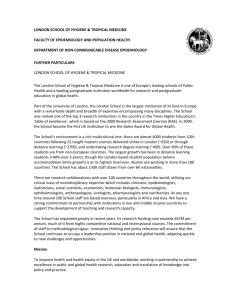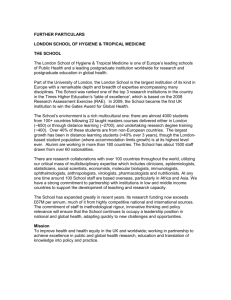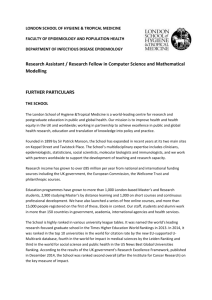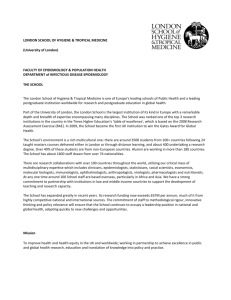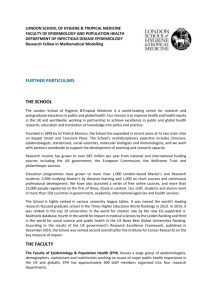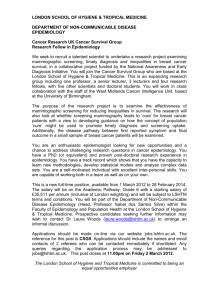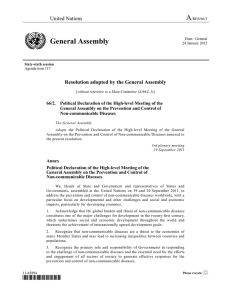Jobs at LSHTM - London School of Hygiene & Tropical Medicine
advertisement
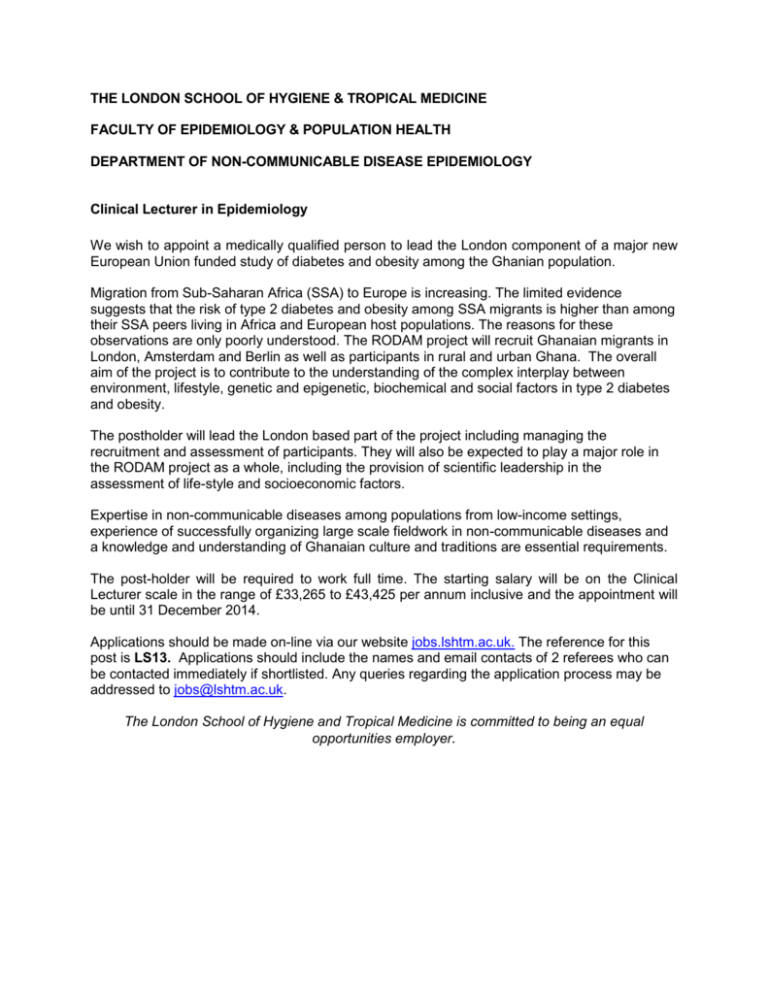
THE LONDON SCHOOL OF HYGIENE & TROPICAL MEDICINE FACULTY OF EPIDEMIOLOGY & POPULATION HEALTH DEPARTMENT OF NON-COMMUNICABLE DISEASE EPIDEMIOLOGY Clinical Lecturer in Epidemiology We wish to appoint a medically qualified person to lead the London component of a major new European Union funded study of diabetes and obesity among the Ghanian population. Migration from Sub-Saharan Africa (SSA) to Europe is increasing. The limited evidence suggests that the risk of type 2 diabetes and obesity among SSA migrants is higher than among their SSA peers living in Africa and European host populations. The reasons for these observations are only poorly understood. The RODAM project will recruit Ghanaian migrants in London, Amsterdam and Berlin as well as participants in rural and urban Ghana. The overall aim of the project is to contribute to the understanding of the complex interplay between environment, lifestyle, genetic and epigenetic, biochemical and social factors in type 2 diabetes and obesity. The postholder will lead the London based part of the project including managing the recruitment and assessment of participants. They will also be expected to play a major role in the RODAM project as a whole, including the provision of scientific leadership in the assessment of life-style and socioeconomic factors. Expertise in non-communicable diseases among populations from low-income settings, experience of successfully organizing large scale fieldwork in non-communicable diseases and a knowledge and understanding of Ghanaian culture and traditions are essential requirements. The post-holder will be required to work full time. The starting salary will be on the Clinical Lecturer scale in the range of £33,265 to £43,425 per annum inclusive and the appointment will be until 31 December 2014. Applications should be made on-line via our website jobs.lshtm.ac.uk. The reference for this post is LS13. Applications should include the names and email contacts of 2 referees who can be contacted immediately if shortlisted. Any queries regarding the application process may be addressed to jobs@lshtm.ac.uk. The London School of Hygiene and Tropical Medicine is committed to being an equal opportunities employer. THE LONDON SCHOOL OF HYGIENE & TROPICAL MEDICINE FURTHER PARTICULARS Clinical lecturer in epidemiology THE SCHOOL The London School of Hygiene & Tropical Medicine is one of Europe’s leading schools of Public Health and a leading postgraduate institution worldwide for research and postgraduate education in global health. Part of the University of London, the London School is the largest institution of its kind in Europe with a remarkable depth and breadth of expertise encompassing many disciplines. The School was ranked one of the top 3 research institutions in the country in the Times Higher Education’s 'table of excellence', which is based on the 2008 Research Assessment Exercise (RAE). In 2009, the School became the first UK institution to win the Gates Award for Global Health. The School’s environment is a rich multicultural one: there are almost 4000 students from 100+ countries following 22 taught masters courses delivered either in London (~650) or through distance learning (~2700), and undertaking research degree training (~400). Over 40% of these students are from non-European countries. The largest growth has been in distance learning students (>40% over 3 years), though the London-based student population (where accommodation limits growth) is at its highest level ever. Alumni are working in more than 180 countries. The School has about 1500 staff drawn from over 60 nationalities. There are research collaborations with over 100 countries throughout the world, utilizing our critical mass of multidisciplinary expertise which includes clinicians, epidemiologists, statisticians, social scientists, economists, molecular biologists, immunologists, ophthalmologists, anthropologists, virologists, pharmacologists and nutritionists. At any one time around 100 School staff are based overseas, particularly in Africa and Asia. We have a strong commitment to partnership with institutions in low and middle income countries to support the development of teaching and research capacity. The School has expanded greatly in recent years. Its research funding now exceeds £67M per annum, much of it from highly competitive national and international sources. The commitment of staff to methodological rigour, innovative thinking and policy relevance will ensure that the School continues to occupy a leadership position in national and global health, adapting quickly to new challenges and opportunities. Mission To improve health and health equity in the UK and worldwide; working in partnership to achieve excellence in public and global health research, education and translation of knowledge into policy and practice. THE FACULTY The Faculty of Epidemiology & Population Health (EPH) houses a large group of epidemiologists, demographers, statisticians and nutritionists working on issues of major public health importance in the UK and globally. EPH has approximately 330 staff members organised into five research departments. Department of Population Studies Department of Infectious Disease Epidemiology Department of Medical Statistics Department of Non-communicable Disease Epidemiology Department of Nutrition and Public Health Intervention Research The Faculty has a teaching programme consisting of nine MSc courses: Epidemiology, Demography and Health, Medical Statistics, Public Health in Developing Countries (run jointly with the Faculties of Infectious & Tropical Diseases and Public Health & Policy), Public Health Nutrition, Reproductive & Sexual Health Research, Veterinary Epidemiology (run jointly with the Royal Veterinary College), and the Distance Learning courses in Epidemiology and Clinical Trials. The Faculty also has approximately 149 research students studying for an MPhil, PhD or DrPH degree. The Head of Faculty is Professor Laura Rodrigues. THE DEPARTMENT DEPARTMENT OF NON-COMMUNICABLE DISEASE EPIDEMIOLOGY (NCDE) is the main focus of research on the epidemiology of non-communicable diseases at the London School of Hygiene & Tropical Medicine. While most of our studies have been in the UK or other high income countries, we have a growing programme of research on non-communicable diseases in low and middle income countries, including India and parts of the former Soviet Union. Research interests range from genetic susceptibility to disease, through metabolic and endocrine disease mechanisms to personal behaviours and the population health effects of changes in national diets and drinking behaviours. Themes include determinants of ethnic variation in disease risk; adverse drug reactions; epidemiology of ageing; foetal and childhood origins of adult disease; determinants of reproductive outcomes; cardiovascular disease; growth factors and cancer risk; natural history of genital human papillomavirus (HPV); time trends in cancer survival; non-communicable diseases in low and middle income countries. The unit has considerable methodological strength and experience, particularly in the analysis of genetic association studies and the conduct and analysis of large scale longitudinal cohort and record linkage studies. We work closely with colleagues in other units and departments and have excellent collaborative links with researchers in other institutions around the world. Funding comes from a wide variety of sources including the Medical Research Council, the Wellcome Trust and Cancer Research UK. The Department Head is Professor Isabel dos Santos Silva. THE POST JOB DESCRIPTION Post: Clinical lecturer in epidemiology Responsible to: Professor Liam Smeeth Grade: Clinical staff not holding an honorary consultant contract Responsibilities Research - Undertake the programme of work included in the RODAM proposal: “Type 2 diabetes and obesity among sub-Saharan African native and migrant populations: dissection of environment and endogenous predisposition” - Supervise the fieldwork and data collection among Ghanaian populations in London - Work collaboratively with the co-investigators of RODAM and with the research staff employed in other work packages that are part of the programme, including travel to collaborative meetings as needed to ensure smooth running of the project - Lead and contribute to peer reviewed publications - Identify and develop collaborative working relationships with external researchers working in related fields - Present research findings to internal and external audiences - Contribute to, and with appropriate supervision to lead, funding applications - Develop and undertake related work on non-communicable diseases in sub-Saharan Africa Teaching - Take an organisational role in the School's programme of teaching - Develop new teaching materials (lectures and workshops) in the post-holders own areas of expertise - Contribute to the teaching of epidemiological and statistical methods for our postgraduate students and short courses - Undertake appropriate training in teaching methods as required by the School Citizenship - Advise and supervise less experienced research staff (both LSHTM staff and external collaborators) in clinical issues and epidemiological techniques and design - Contribute to general activities of the Department, Faculty and School that help to promote the objectives of the School - Contribute to the management of the Department and Faculty as appropriate - Contribute to international research through collaboration and other appropriate external activities Any other duties that may be required which are consistent with the nature and grade of the post. Person specification Essential qualifications and skills 1. A PhD in a relevant area 2. Medical degree 3. Experience of successfully organising, supervising and completing large scale population based fieldwork in the area of non-communicable diseases 4. Experience of undertaking research among multi-ethnic populations in the United Kingdom 5. Knowledge and understanding of Ghanaian culture and traditions and ability to apply this knowledge to research fieldwork 6. Experience of analysing large scale datasets derived from population based studies 7. Ability to work well as part of a team 8. Knowledge and experience of using Stata 9. Proven track record of peer reviewed publications Desirable qualifications and skills 1. Knowledge of an Akan dialect, preferably Twi. SALARY AND CONDITIONS OF APPOINTMENT The appointment will commence from 26 May 2012 to 31 December 2014. The appointment will be made on LSHTM’s Clinical Lecturer scale in the range of £33,265 to £55,936. The post will be subject to the LSHTM terms and conditions of service. Membership of the USS Scheme is available. APPLICATIONS Applications should be made on-line at our website at jobs.lshtm.ac.uk. The reference for this post is LS13. Online applications will be accepted by the automated system until midnight on of the closing date. Any queries regarding the application process may be addressed to jobs@lshtm.ac.uk. The supporting statement section should set out how your qualifications, experience and training meet each of the selection criteria. Please provide one or more paragraphs addressing each criterion. The supporting statement is an essential part of the selection process and thus a failure to provide this information will mean that the application will not be considered. An answer to any of the criteria such as "Please see attached CV" will not be considered acceptable. Please note that if you are shortlisted and are unable to attend on the interview date it may not be possible to offer you an alternative date. The London School of Hygiene & Tropical Medicine is committed to being an equal opportunities employer.
